Let’s get straight to the point, can Guinea Pigs eat pineapple?
Yes they can, although within moderation. (like most good things right?) There is a lot more to the answer than that. You might want to know how often they can have pineapple, or how much. Not only that but what part of the pineapple can they eat and what part should they stay away from?
In this article I’m going to go through all of that and much more.
But Pineapple is fine for them and it’s got a lot of goodness for them. As it is a treat, they should only have it once a week. You also want to make sure its fresh pineapple and not the tinned stuff, as that has additional sugar added and extra preservatives that might not be good for your guinea pig.
Pineapple is one of my favorite fruits and since giving a little to Millie and Molly, it seems to be one of their favorites now. They’ll often start whistling if they get the smell of it.
So let’s go into more detail on whether guinea pigs can eat pineapple or not.
Key Takeaways
- Yes guinea pigs can eat pineapple
- They should only eat fresh pineapple
- Cannot eat skin, leaves, top or core
- Contains good amount of Vitamin C
- Only given as a treat and in moderation
Can guinea pigs eat pineapple?
Your guinea pigs diet is going to be mostly hay. In fact around 80% of their diet should consist of hay. The remaining 20% should be vegetables, pellets and perhaps a nice treat every now and again.
A nice treat could be a little bit of Pineapple, but can guinea pigs eat them? Yes, Guinea Pigs can eat pineapple. They provide a nice amount of Vitamin C, as well as some additional health benefits. As with all fruits, you should only give them a little amount once a week. This is because they’re high in natural sugar, which having too much could cause problems.
Nutrition in Pineapple for Guinea Pigs
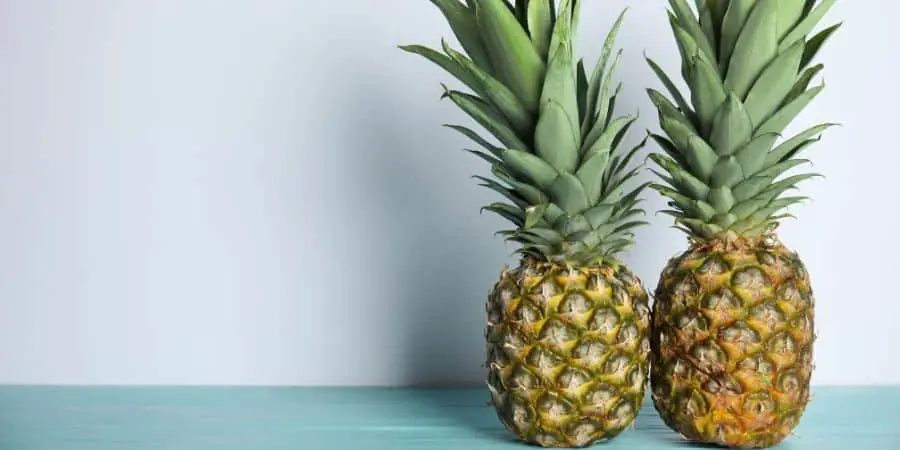
Below, you’ll see the nutrients found in a Pineapple. I’ll also go into detail on some of these and explain the impact they will have on your Piggies.
| Nutrients | Amount |
|---|---|
| Vitamin C | 47.8 mg/ 100 g |
| Vitamin A | 3 µg |
| Folate | 18 µg/ 100 g |
| Calcium | 13 mg/ 100 g |
| Phosphorous | 8 mg/ 100 g |
| Potassium | 109 mg/ 100 g |
| Fiber | 1.4 g/ 100 g |
| Sugar | 9.85 g/ 100 g |
| Protein | 0.54 g/ 100 g |
| Carbs | 13.12 g/ 100 g |
| Calories | 50 Kcal |
| Fat | 0.12 g/ 100 g |
| Water | 86 g/ 100 g |
Vitamin C
Vitamin C is important to Guinea Pigs as their bodies are not able to produce it naturally. This makes pineapple a great treat for your piggies as it does contain a high amount of Vitamin C.
If they don’t get enough Vitamin C then they could become weak, lethargic and even stop eating causing them to lose weight.
Luckily they cannot have too much Vitamin C as excess will just leave their bodies via their urine.
Calcium
Calcium is very important and is an essential mineral for your guinea pig. It’s very common for Guinea Pigs to have a deficiency in calcium. Although at the same time, it’s important that they don’t get too much as this can result in bladder stones. Pineapple doesn’t have too much calcium in it. But you do still want to keep an eye on it.
Fiber
Guinea Pigs should have a high fiber diet. This is important as it helps to keep the bacteria in their gut balance, which helps to give them a healthy digestion. The hay in their diet will normally be all that’s needed to give them their daily dosage of fiber. Any in the pineapple will just add to this.
Sugar
The main drawback to letting your guinea pig eat fruits such as Pineapple is the sugar content. Sugar is not good for a guinea pig as it can cause their gut bacteria to become imbalanced, causing digestive problems. Too much and they could get diarrhea, which could be life threatening. – As long as a little is given in moderation then this shouldnt be a problem.
Is Pineapple Good For Guinea Pigs
Yes, as long as your Guinea Pig eats pineapple in moderation it has some great health benefits. Such as;
Heart Health
Magnesium is really important when it comes to improving the health of your guinea pigs heart. This nutrient can help to increase the amount of blood pumping around the body. Not only that but it also helps to strengthen the heart muscle.
Pineapple is also low in fat, which prevents fat from causing problems with your guinea pig’s heart.
A good heart is important for Guinea Pigs. As they are a prey animal, they do get scared very easily.
Improved Blood Clotting
Guinea Pigs can be prone to cuts or scratches, as they can often have a disagreement with each other from time to time. (There even more at risk if they need their claws cutting)
Pineapple contains Vitamin K, which is known to help the blood to clot better. So if they do cut themselves, it should clot better which will prevent too much blood loss.
Boosts Immune System
A common illness that unhealthy cavies get is scurvy and this is often caused by a lower immune system and a lack of Vitamin C.
As already mentioned, Pineapple has a high level of Vitamin C. This can help not only prevent scurvy but also help to strengthen their overall immune system.
Reduces Aging
Pineapple has something known as manganese, which is a natural antioxidant. This helps to improve the immune system even more. As well as that, it can also help to reduce aging.
This helps your guinea pig to potentially live even longer.
Is Pineapple Bad For Guinea Pigs
As you’ve seen above, Pineapple provides your guinea pig with a lot of good when they eat it. It is however important that they do only have pineapple in moderation. If you feed them pineapple too much, they could experience some negative effects.
The most common are;
Diarrhea
Guinea Pigs find it very hard to digest sugar. Too much and they could get overweight which can cause a lot of health problems. Sugar can also lead to digestion issues such as Diarrhea.
Pineapple does contain natural sugar, which is why you should only let your guinea pig eat it in moderation. A little amount every 1-2 weeks.
Obesity
As I just mentioned, the sugar content can make your piggies put on weight and even become obese. Not only that but this can then lead to further complications such as heart issues and even diabetes.
Kidney Stones
It can be common for guinea pigs to get kidney stones.This happens when they get too much calcium. Calcium might be good for us humans but in Guinea Pigs it can cause urinary tract problems such as kidney stones.
These stones can become very painful and can even be fatal. If you see your piggie not urinated properly or looks like it’s in pain, get them checked out asap.
How To Serve Pineapple To Your Guinea Pig
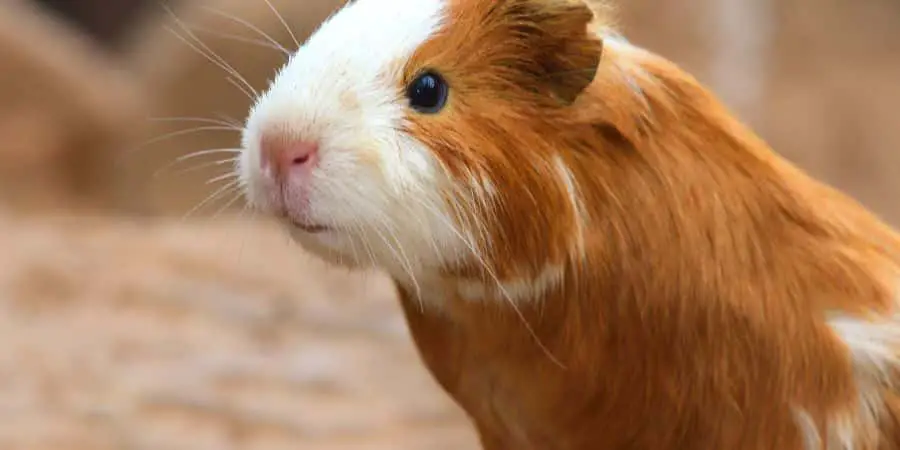
So now you know Guinea Pigs can eat pineapple. How do you serve it to them?
The first thing you need to ensure is that you get the correct pineapple. You dont want to be giving them tinned pineapple due to the chemicals and other things they add into it. Its also important you do not give them the juice, all they need to drink is water.
I would stick to fresh pineapple, ideally organic for additional nutrients.
Remove the top and bottom of the pineapple and then remove all of the outer skin. Its important to make sure there are no hard parts of the skin on it.
You then want to cut the pineapple into small cubes, roughly 1 inch.
How much pineapple can guinea pigs eat?
As mentioned above, if you’re going to let your guinea pig eat pineapple then don’t let them have too much. Roughly 1 cubic inch should be plenty.
It’s important that you do make sure you get the non sweetened variation, as this will dramatically increase the amount of sugar content. This will have the risk of more side effects.
One thing about how much pineapple to give your guinea pig…It’s going to depend on the individual pig.
If they are very young then do not give them any, as their digestion has not developed properly yet.
How Often Can Your Guinea Pig Eat Pineapple
As already mentioned Pineapple does have a lot of goodness, although it does have a high sugar content.
Because of this, it’s important to only give them occasionally as a treat.
Can guinea pigs eat pineapple leaves?
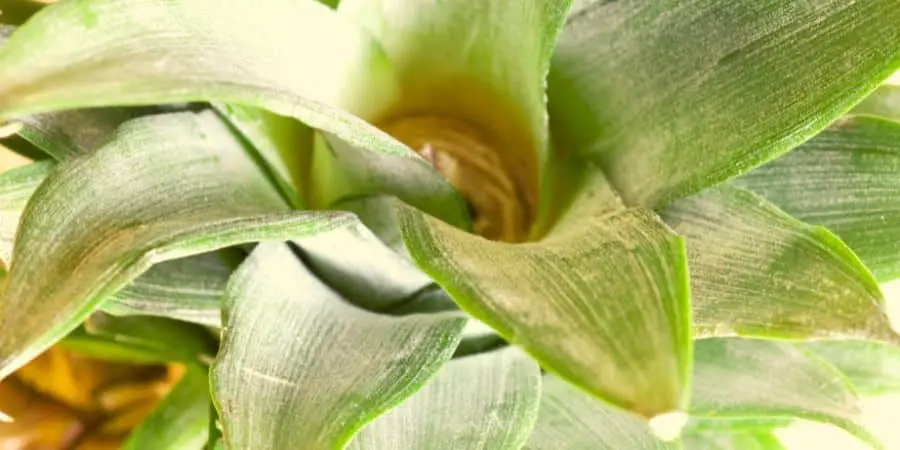
Even though guinea pigs can eat pineapple, they cannot eat the pineapple leaves. They could cause harm if your piggies were to eat them due to them having thorns, there also not a very nice texture.
The pineapple leaves can also contain some toxins that could cause harmful effects on your guinea pigs health.
Can guinea pigs eat pineapple skin?
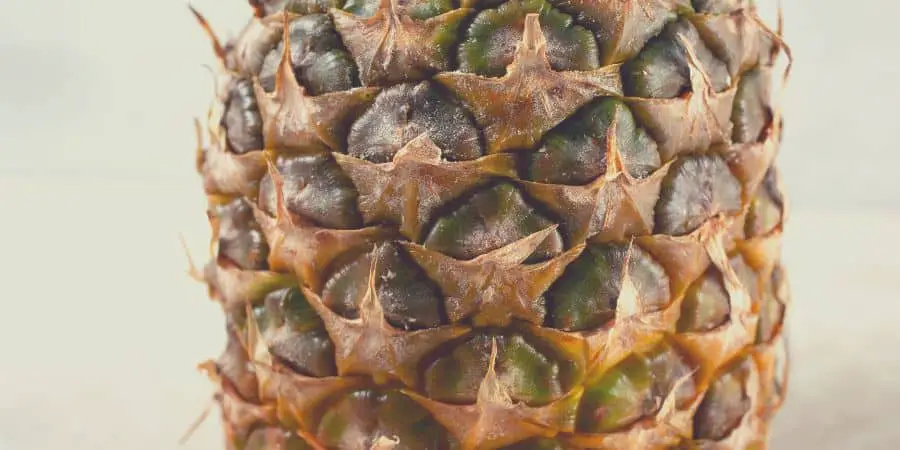
Just like with the leaves, guinea pigs cannot eat the pineapple skin. They are hard and rough, so would not be suitable for your piggies to be able to swallow. Not only that but they could cause a blockage or impact their digestive health.
Can guinea pigs eat pineapple tops?
Pineapple tops are hard and do not have a nice texture, so it would be best not to give these to your guinea pig. They’re just not going to be able to chew through them.
There’s also the risk that it could have some pesticides or toxins that could be harmful to your guinea pig.
Can guinea pigs eat pineapple core?
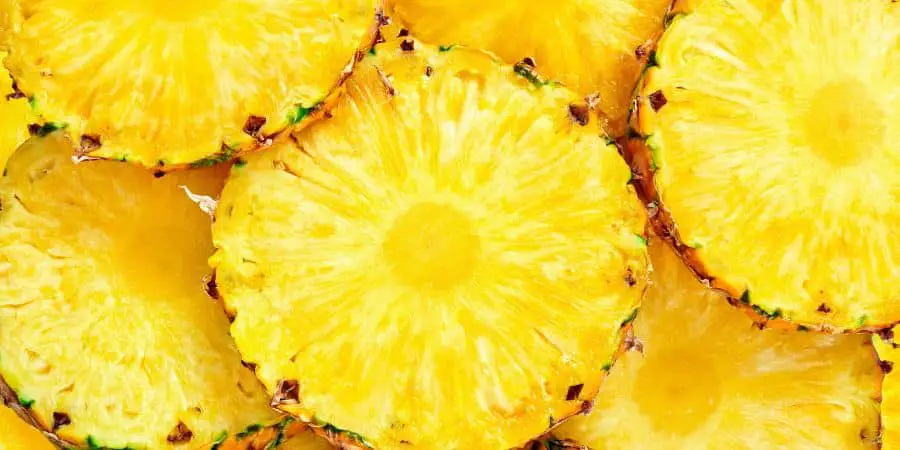
Have you ever tried to eat the pineapple core? They’re not the most flavoursome.
You shouldn’t give your guinea pigs the core of the pineapple. They’re just not as sweet as the main fruit and you might find they don’t want to eat it.
If they do eat any of it, don’t be too worried. It’s not harmful to them, although they might struggle to eat them.
Can guinea pigs drink pineapple juice?
No, your guinea pig cannot drink pineapple juice. They don’t need any other liquids in their diet other than water. The main reason why they shouldn’t drink juice is because of the sugar or sweetener that has been added.
The manufactures also include preservatives to help it last longer.
Both the sweetener and the preservatives are not good at all for your guinea pigs health.
Can guinea pigs eat canned pineapple?
Just like the juice, canned pineapple contains a lot of sugar and preservatives to make the best before date longer. All of these can cause diabetes, obesity and even digestive issues. So no, guinea pigs cannot eat canned pineapple.
Can guinea pigs eat dried pineapple?
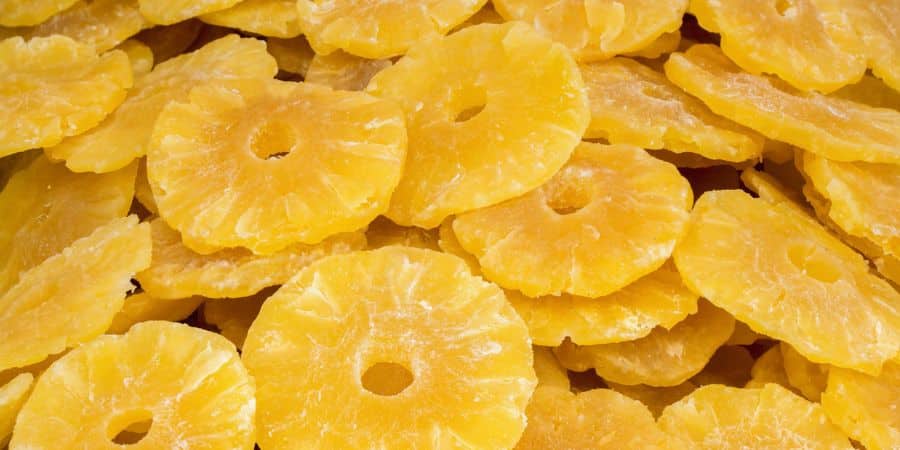
Dried pineapple is one of the worst ways to offer pineapple to your guinea pig. Not only does it have sugar and preservatives, which we know is already bad for their health. When the pineapple is dried, one of its main vitamins, Vitamin C is taken away.
This is one of the main reasons why you would want your piggies to have pineapple. So if its no longer in it, there’s no point in giving it to them.
Can guinea pigs eat frozen pineapple?
You might think that your guinea pig can eat frozen pineapple, as it’s just pineapple frozen right? Nothing has been added to it, so what’s the harm?
Guinea pigs shouldn’t eat anything frozen.
Cold foods can cause problems with your guinea pigs digestion. It’s very common that cold foods can cause diarrhea.
So, No guinea pigs cannot eat frozen pineapple. You can however freeze fresh pineapple to help it last longer. Just make sure you let it get to room temperature before you give it to your guinea pigs.
Can Guinea Pigs Eat Pineapple? Final Thoughts
So there you have it, hopefully this article has helped to answer the question. “Can guinea pigs eat pineapple?”
Guinea pigs can eat pineapple, but it does depend on what part of the pineapple you give them. It’s important that you only give them the main fruit and not the skin, leaves or top. You also need to make sure you just give them fresh pineapple.
Pineapple is a great treat for your guinea pigs, it’s full of nutrients and minerals that are good for your piggies. For example Vitamin C.
Like with anything with guinea pigs, they should only have a small amount and in moderation.
They do have a very sensitive digestive system.
So you should only let them eat roughly a 1 inch piece of pineapple once a week or once every other week.


